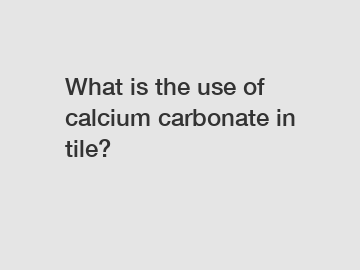What is the use of calcium carbonate in tile?
When it comes to the construction and interior design industry, tiles are a popular choice due to their durability, versatility, and aesthetic appeal. Whether you're considering remodeling your bathroom or renovating your kitchen, tiles play a significant role in enhancing the overall ambiance of your space. But have you ever wondered about the components that make up these tiles? One vital ingredient found in many tiles is calcium carbonate. Let's dive deep into the importance and use of calcium carbonate in tile production.
Calcium carbonate, a chemical compound with the formula CaCO3, is a naturally occurring mineral that has been used for centuries by various civilizations. It is widely available in the Earth's crust in the form of rocks, such as limestone, chalk, and marble. The use of calcium carbonate in tile manufacturing offers numerous advantages that contribute to the quality and longevity of the final product.
Firstly, calcium carbonate acts as a filler and reinforcement agent in the tile production process. When mixed with other raw materials like clay, feldspar, and silica, it enhances the strength and stability of the tiles, making them more resistant to cracks, impact, and wear and tear. This structural integrity is crucial, especially for tiles used in high-traffic areas such as hallways, kitchens, and commercial spaces.

Moreover, calcium carbonate is responsible for the excellent whiteness and brightness of tiles. Its high refractive index allows for superior light reflection, giving the tiles a cleaner and more polished appearance. This characteristic is particularly beneficial in creating a luminous and airy atmosphere in spaces where natural light is scarce. By utilizing calcium carbonate, interior designers and architects can optimize the overall illumination of an area, creating an inviting and visually appealing environment.
In addition to its physical properties, calcium carbonate also imparts specific functionalities to tiles, making them highly sought-after in various applications. One such functionality is the ability of calcium carbonate to regulate moisture absorption. Tiles containing calcium carbonate as part of their composition have lower porosity, preventing moisture from penetrating their surface. This makes them ideal for wet areas such as bathrooms, kitchen backsplashes, and swimming pool borders. The lower porosity significantly reduces the occurrence of mold and mildew, thus ensuring a hygienic and healthy living environment.
Furthermore, calcium carbonate has an excellent heat resistance property. This advantageous characteristic allows tiles to withstand high temperatures without warping, cracking, or deteriorating. Consequently, tiles formulated with calcium carbonate can be utilized around fireplaces, outdoor grills, and other areas exposed to extreme heat. This not only ensures the durability and longevity of the tiles but also enhances the safety of the space they are used in.
It is worth noting that the benefits of using calcium carbonate extend beyond the technical aspects. The compound is widely recognized for its eco-friendliness and sustainability. Tiles made with calcium carbonate contribute to reducing the environmental impact of construction projects. As a natural resource, calcium carbonate is abundant and readily available, ensuring a steady supply without depleting valuable resources. Additionally, its production involves lower energy consumption when compared to other synthetic alternatives, leading to a reduced carbon footprint. For environmentally conscious consumers, selecting tiles with calcium carbonate as an ingredient can be a win-win choice.
In conclusion, calcium carbonate plays a significant role in the production of high-quality tiles. Its contributions to the strength, aesthetics, functionality, and environmental sustainability of tiles are undeniable. From providing structural reinforcement to enhancing brightness, regulating moisture absorption, and withstanding high temperatures, calcium carbonate offers a multitude of advantages that are essential to the modern construction industry. So, the next time you step into a beautifully tiled space, remember the hidden hero behind its elegance and durability – calcium carbonate.
Contact us to discuss your requirements of crystalline flake graphite price, Sepiolite Powder wholesale, heavy calcium powder in bulk. Our experienced sales team can help you identify the options that best suit your needs.


